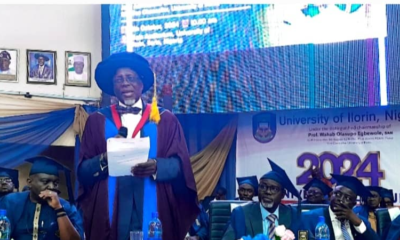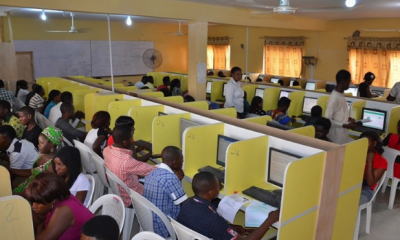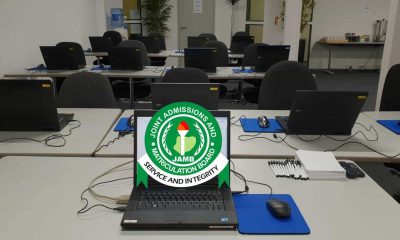NEWS
No Hidden Agenda On JAMB’s Remittance To FG –Prof Oloyede

Prof. Is-haq Olanrewaju Oloyede, Registrar/Chief Executive Officer of Joint Admissions and Matriculation Board (JAMB) sparked off a controversy on financial accountability and integrity of the examination body, when at the end of one year of his appointment, he returned to the coffers of the Federal Government a whopping N5 billion, as surplus of revenue of his charge.
The action caused a stir and provoked a threatened official probe of the board’s past leadership’s management of the institution and its funds, as it was unprecedented. JAMB had always depended on government subventions, which it gulped annually without any such returns. How did the former Vice-Chancellor, University of Ilorin, and Chairman Committee of Vice-Chancellors (CVC) do it?
In this Interview, the Professor of Islamic Studies, explains the numerous changes he introduced since he assumed office in 2016. He also speaks on resistance by some staff to the new order, the controversial examination cut-off marks policy introduced by JAMB, among many other issues.
Can tell us your experience so far as the Registrar of JAMB?
Yes, it has been very revealing experience for me and very educative. I met some shocks and some unpleasant surprises. It has been a mixture of realizing the difference between theory and reality. And also how to operationalize issues when you come across them. Generally, it has been an experience that is worth it.
Can you be a little more specific?
I feel that it has given me a lot of education about some of the things you see from a distance and you think you do not have the grasp of the whole thing. I have come to realize that what you see in the outer part of a situation is not the reality. The reality is much more different than what is in the public domain. And that is one example I have seen. I have been working all my life in the university all my days and all my life in the past three or four decades. I thought I was educated, but stepping into this place I became more educated. Seeing the reality of things and the enormity of the problems we have to face as a nation.
One of the controversies that have trailed your tenure so far is the unprecedented remittance of over N5 billion you made to the coffers of the Federal Government, but criticisms have trailed your action. How did it happen?
Yes I am aware of the controversy, but the controversy is unnecessary. I do not know the other option. I believe that remitting part of what we generated is statutory function. Unless someone is a criminal, you cannot do otherwise. I did not do anything extraordinary by remitting what belongs to government. So, I believe it is an ordinary act. I also believe that rather than lamenting about the past, in my own view, the way to go about it is that henceforth things go on properly. We have to put in place a structure that will ensure that whatever belongs to government is remitted promptly as at when due. I think that it is a lesson for me. It is not in my culture to begin to analyse what went wrong and what did not go wrong. I was appointed with effect from a particular day and I have the responsibility to ensure that everything is perfectly done or almost perfectly done. I am not an auditor and I do not want to act as one. My intention is to get to a table and make sure from that point onward one is as accurate as possible and that is the way I see it. I believe that members of management and staff of JAMB have committed themselves to do what they are supposed to do. We have employed the most sufficient manner of delivering our services and we have been as honest as possible in the discharge of the responsibility entrusted onto us. I believe that, yes questions were being asked about what happened in the past. I wasn’t here in past and I could know what happened in the past or what failed to happened. All I know is that I have been given this assignment and the assignment entails that we employ the most efficient manner of delivering the services and that is exactly what we have done. And it is required of us that when we generate and, of course, we generated a large sum of money and at end of the day after discharging the responsibility, we still had about N8billion as surplus and I don’t know what I am expected to do rather than return the N8billion to government. So far we have remitted N5.2billion. We will remit additional N2.8billion, so that we can have N8billion that rightly belongs to the Federal Government. I have heard the criticisms that we are not a money generating body, yes, we are not, but we are also not a money wasting establishment. I didn’t fix the fee and we have not increased the fee. That was the fee I met on ground. I cannot be accused of imposing fee to generate. I have just come, what have been the fee is what I am collecting and we have tried to reduce the cost of production, the expenses. Whatever remains belongs to government and that is exactly what we have done, by returning. When people talk about why should JAMB be generating money, that is part of the surprise I told you earlier that I found in public office. How can somebody say we have not done correctly because we returned money that belongs to government? No, I believe that is the right thing to do, but when you go across the world, when you look globally, talk of Universities and Colleges Admissions Service (UCAS) in UK. Look at what UCAS is doing in UK for education? The government of UK is not spending a pound on UCAS, equivalent of JAMB in UK. They generate money, pay their salaries and fund other activities. In addition, they fund some educational projects for the development of their country. That is what JAMB is expected to do. I believe that government has no business funding JAMB, but in addition to funding itself, I believe JAMB should be able to provide some support or some educational support. I am not totally comfortable that we are returning money to the main pool. I would have been more comfortable if money generated or the surplus generated is redirected towards a particular development in the education sector. But I am not the maker of the law, the law requires that money should go back to the general pool, that is what we have done. If I have my way, I will create a situation whereby we can redirect the fund towards the education sector, so that the education sector can feel the impact. It is done in many countries and we exchange note with our colleagues all over the World and that when they generate such money, they have some areas within the education sector they are expected to invest the surplus on. That is my own wishful thinking, but the position of the law is that we return the money to the national treasure that is what we have done.
Have you ever made this view known to government?
Let me say that, yes, if I have the opportunity to make suggestions, I will make and even if I have made such suggestion, you don’t expect me to own up in the public that I have made suggestion. It is suggestion, it can be taken or rejected. So, I believe that, yes, it is a good advice that when I have such opportunity I should make the advice to government.
You are aware that your predecessors are being probed because of the remittance of the N5.2billion?
It might be true. I do not have the fact that he is being probed. But my own interpretation of it is that, do what is correct. It is not intended to put anybody in trouble and in my own view I don’t think the right thing to do is to start thinking wrong. Many people might want to do what is right and might be thinking I don’t want to put anybody in trouble. So, that is not the intention. The intention is to do what is correct and go on from there. I am readily available to government to ensure I do whatever is necessary.
When you were appointed, one of the misconceptions is that you were a professor of Islamic Studies and you were not going to deliver. Given what you’ve done within a short period especially on the ICT base, how did you handle such cynicism?
There are so many people, people underrate because of their own perception of what the person is. I think is because people have not studied where I am coming from. When you talk about effective utilization of CBT for testing in the university system, I can say with some level of certainty that there is no way you mention the utilization of CBT for examination in Nigerian university that you will not mention my name, because I started it in the first instance at University of Ilorin when I was vice chancellor. And even when JAMB itself, it is there on record, wanted to start CBT, they had nowhere in Nigeria to look up except Netherlands and UK. The local place they could come to is University of Ilorin, we provided the path. It was my idea, I called the management of the university that this is what I want to do and the management agreed with me, we had people and we started the CBT. When JAMB was to start, they had to consult UNILORIN. They say ‘CBT the University of Ilorin Way’, that was the topic and UNILORIN had to provide the path way for JAMB. So those who are ignorant about it and who thought he (Prof Oloyede) will not be able to perform because he is a professor of Islamic Studies, they only know part of the story, they do not have the full story. I am not in any way saying that maybe money has not been mismanaged in the past, I am not saying so, but part of the problem is also the fact that appropriate technology might have not have been used. They were not using appropriate technology, they were using expensive technology, that is part of the story. So, when we came on board, what we applied in 2007, that was the level I still met JAMB and technology has moved beyond that level. So, we employed a more efficient manner and method of doing the business, that is why we could achieve it at a lower cost.





























